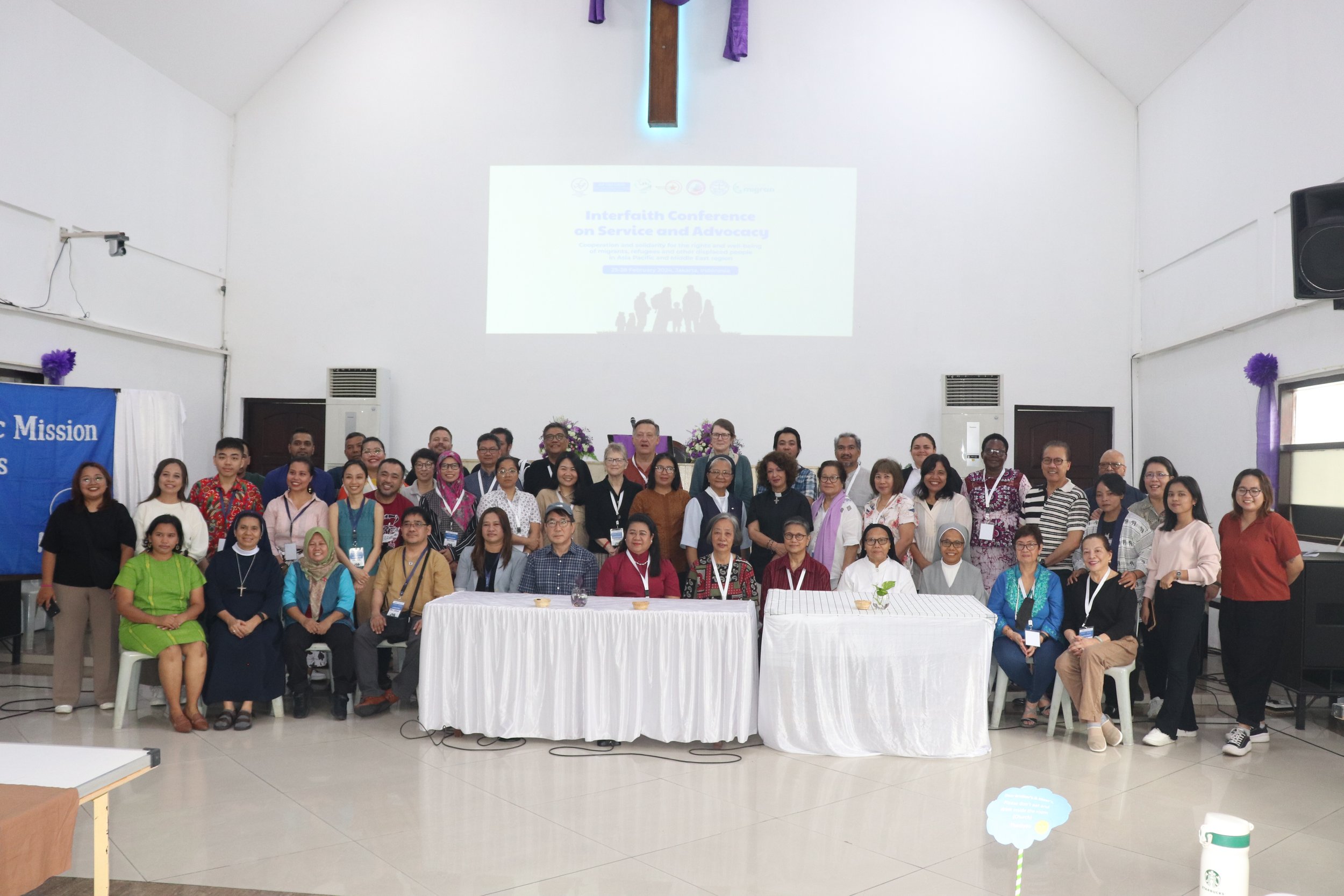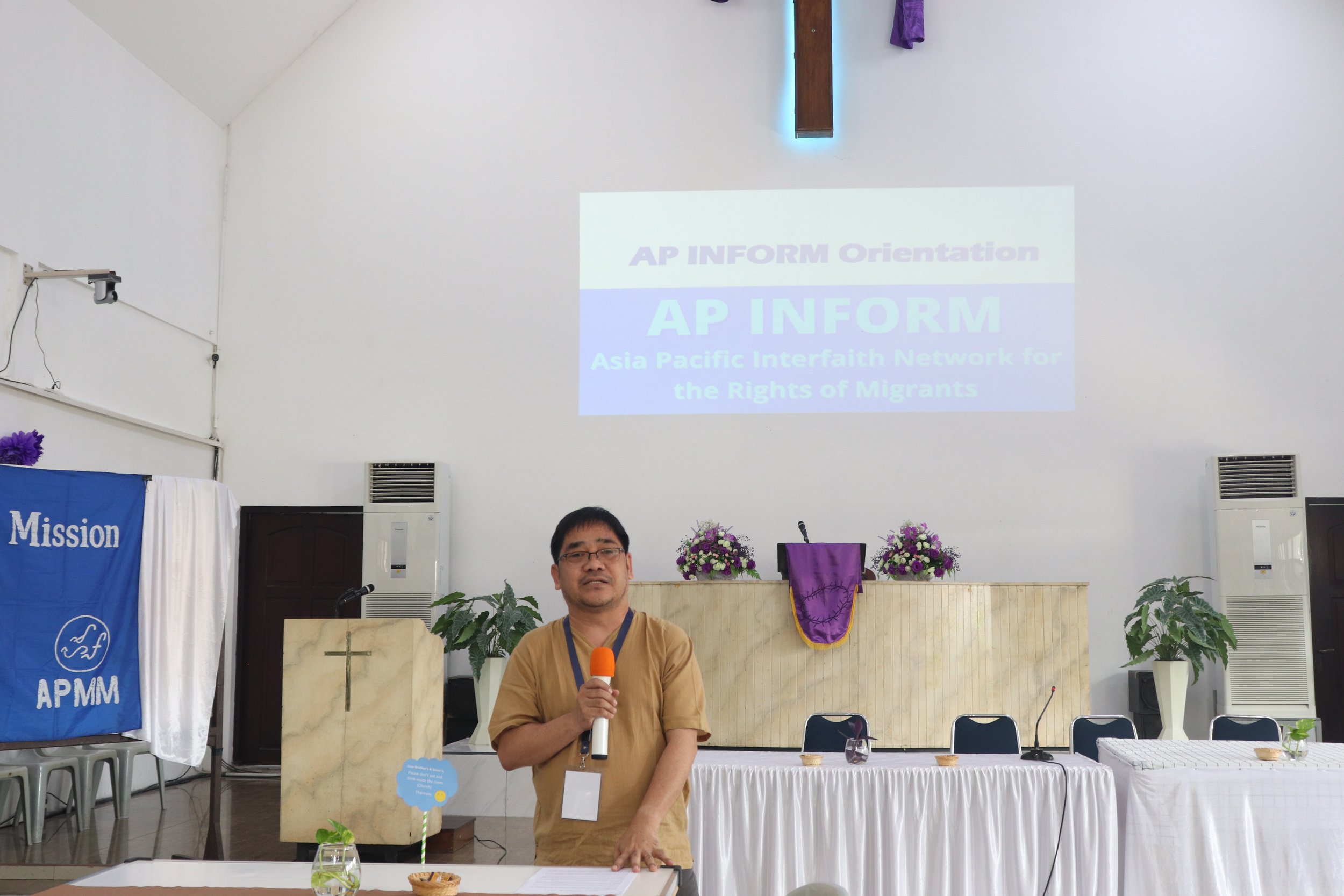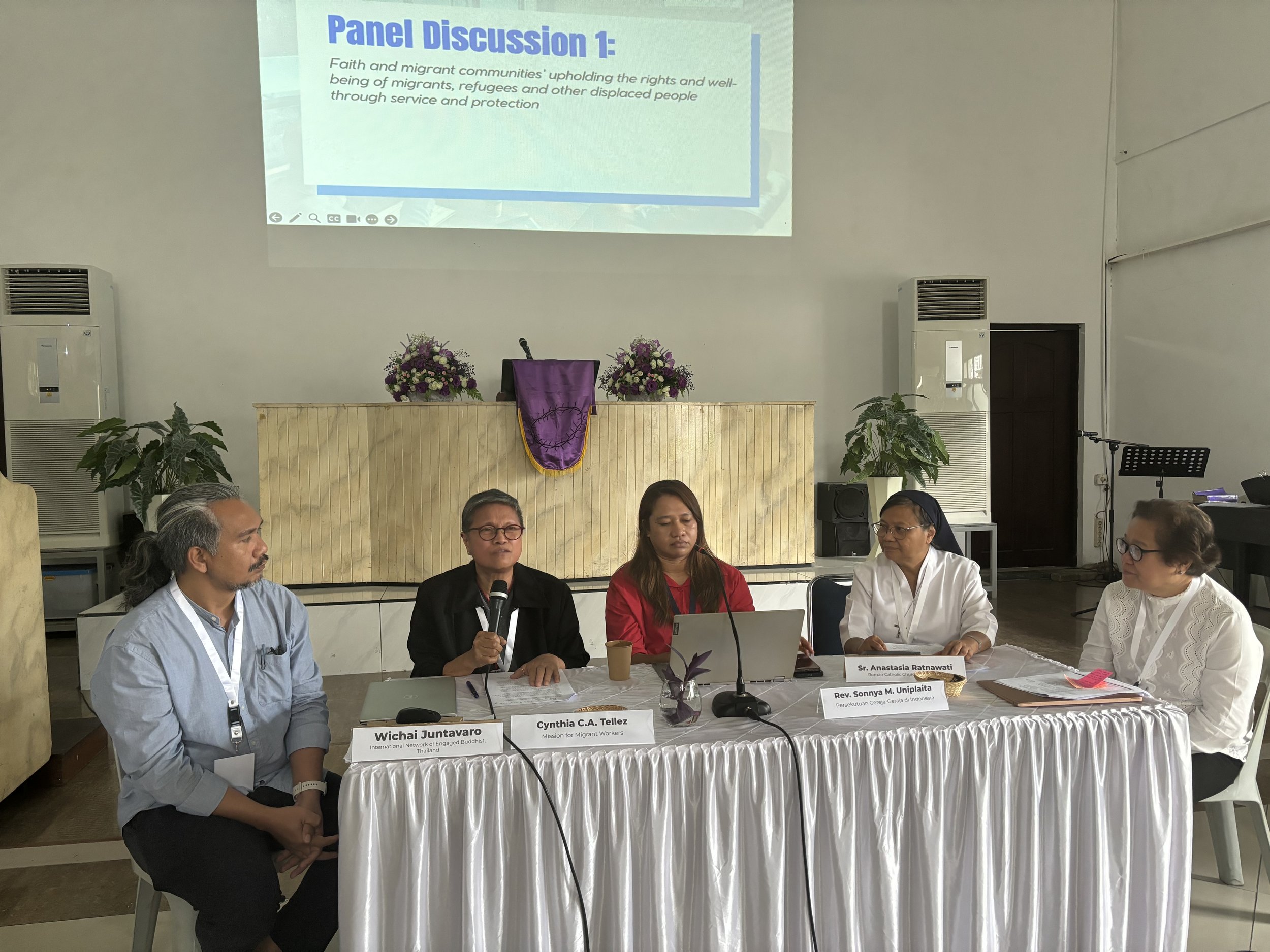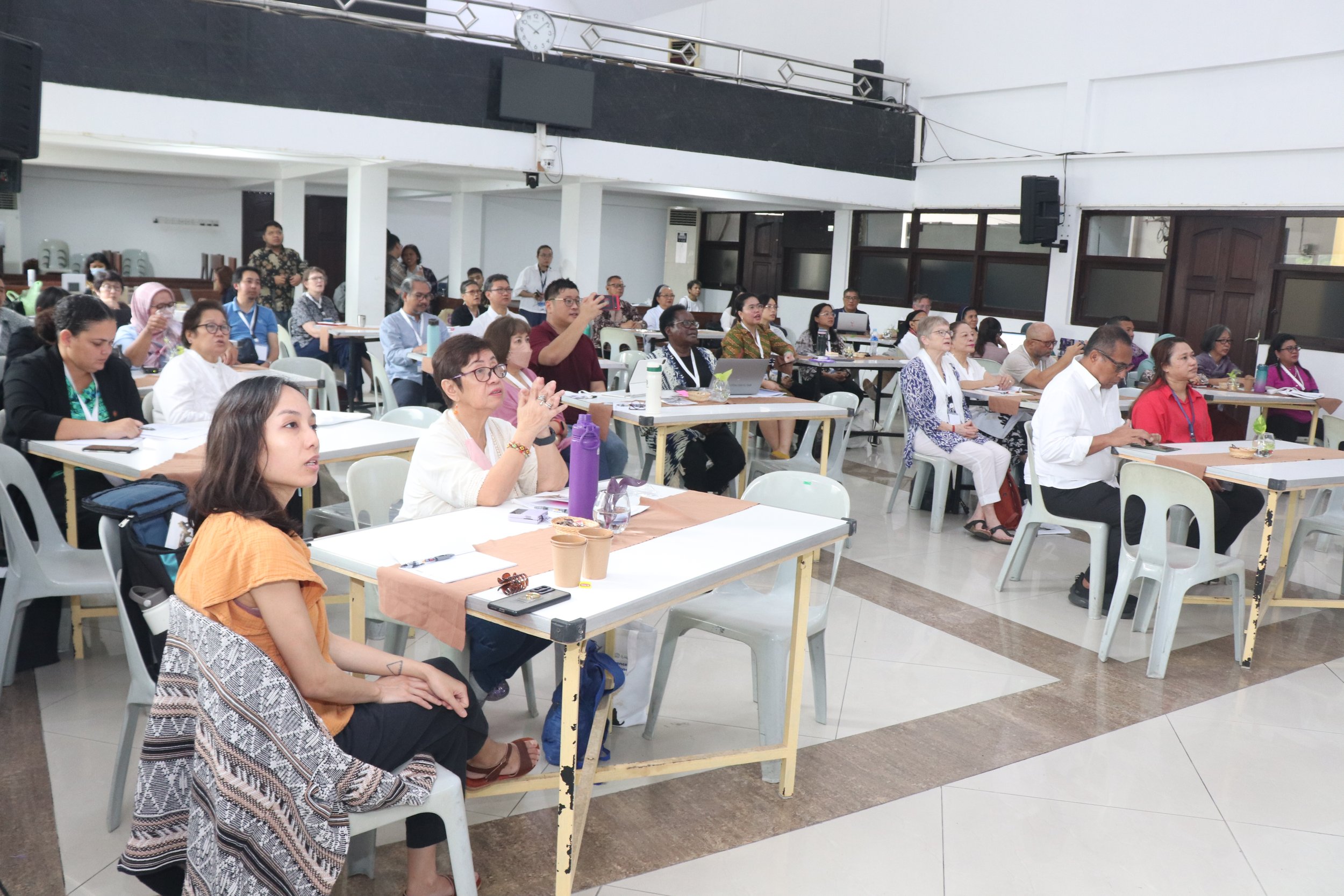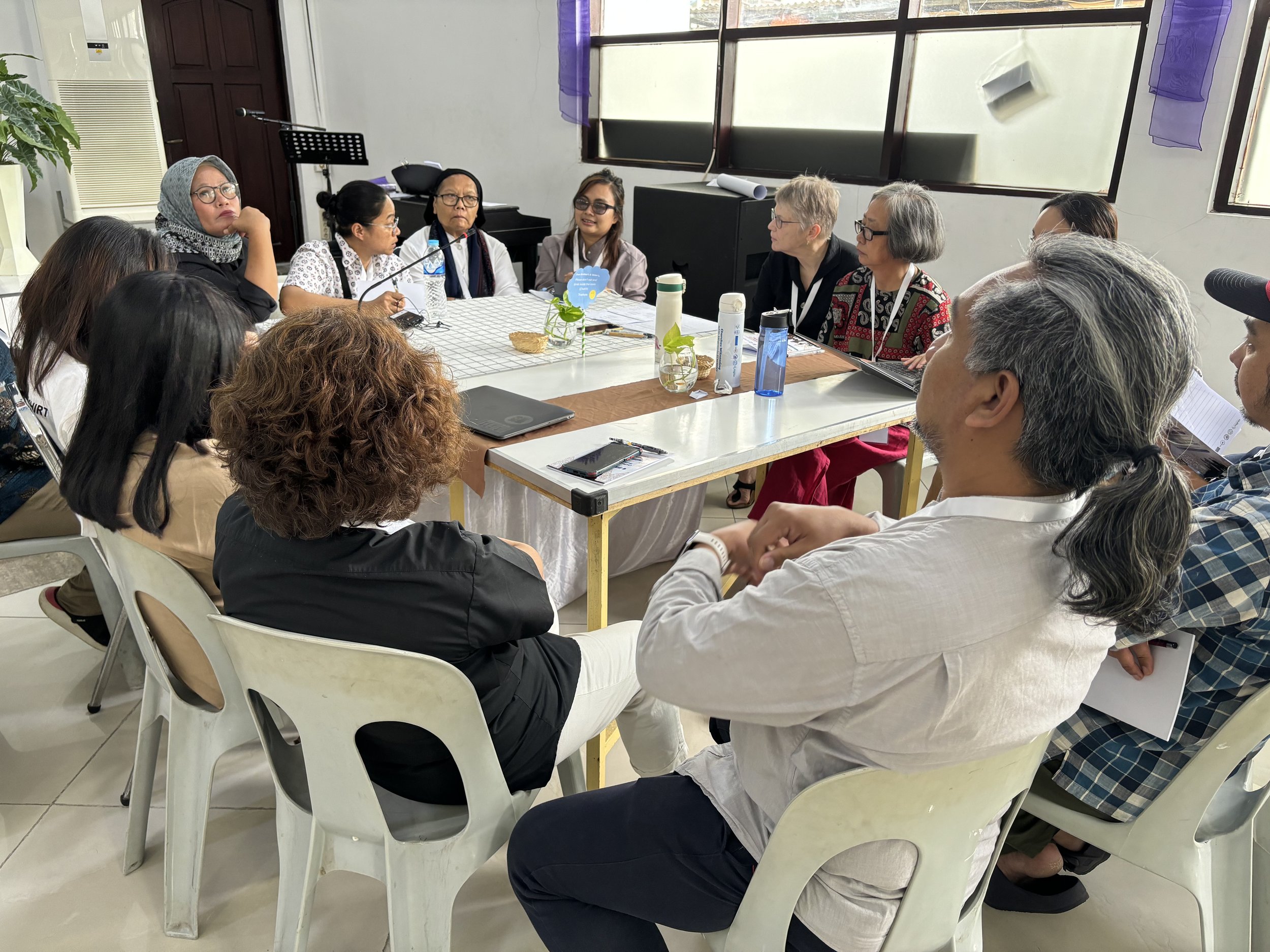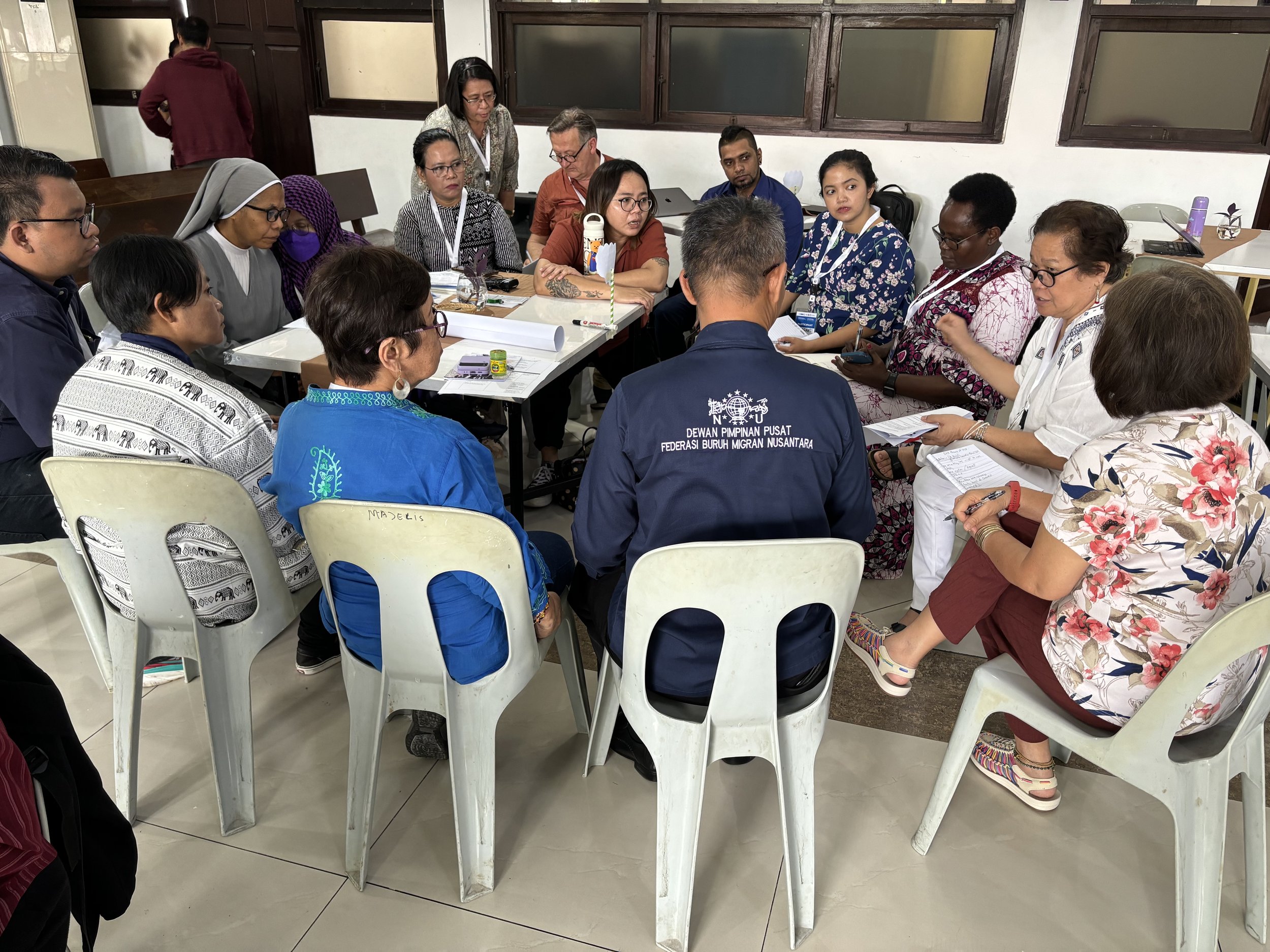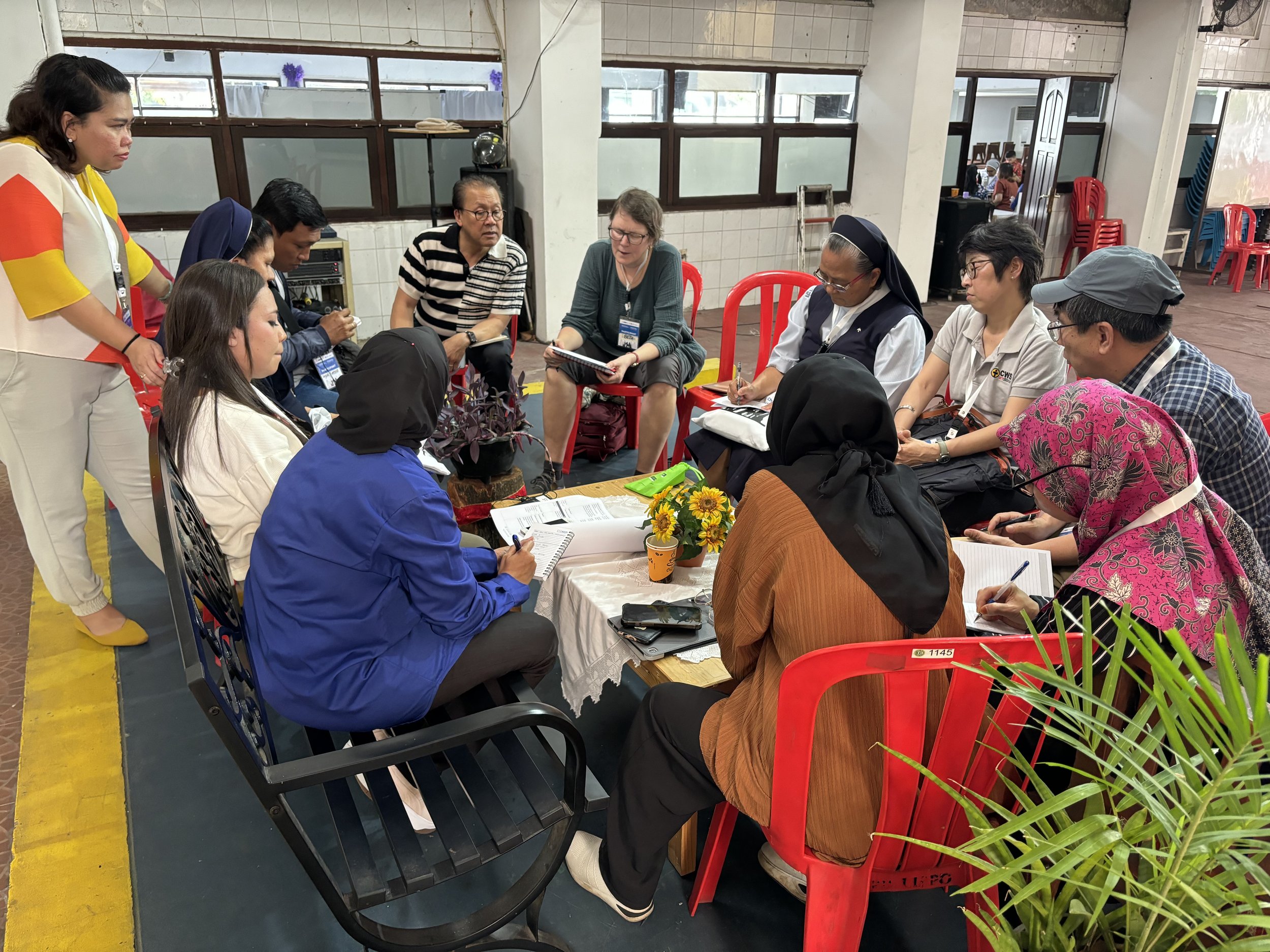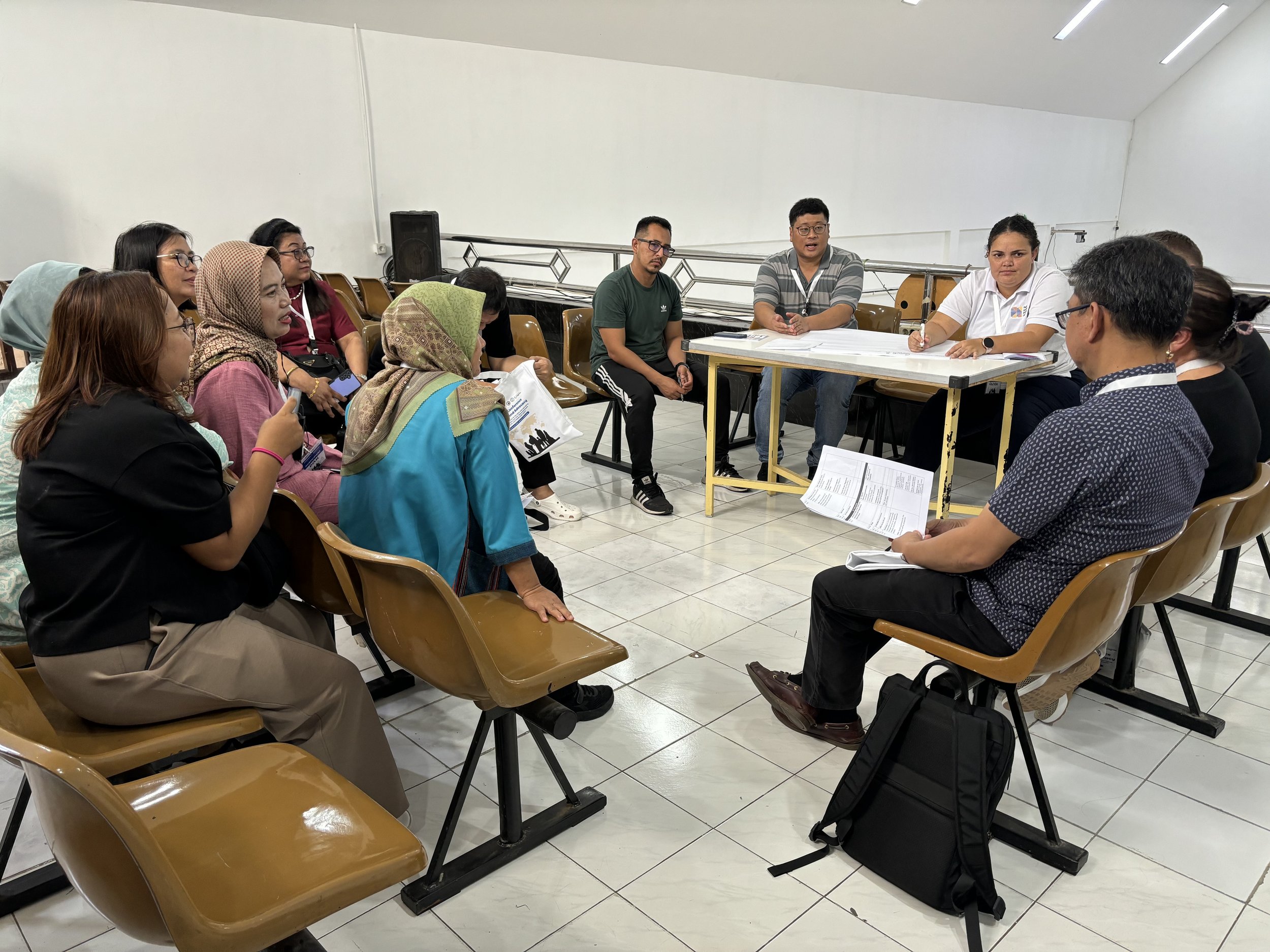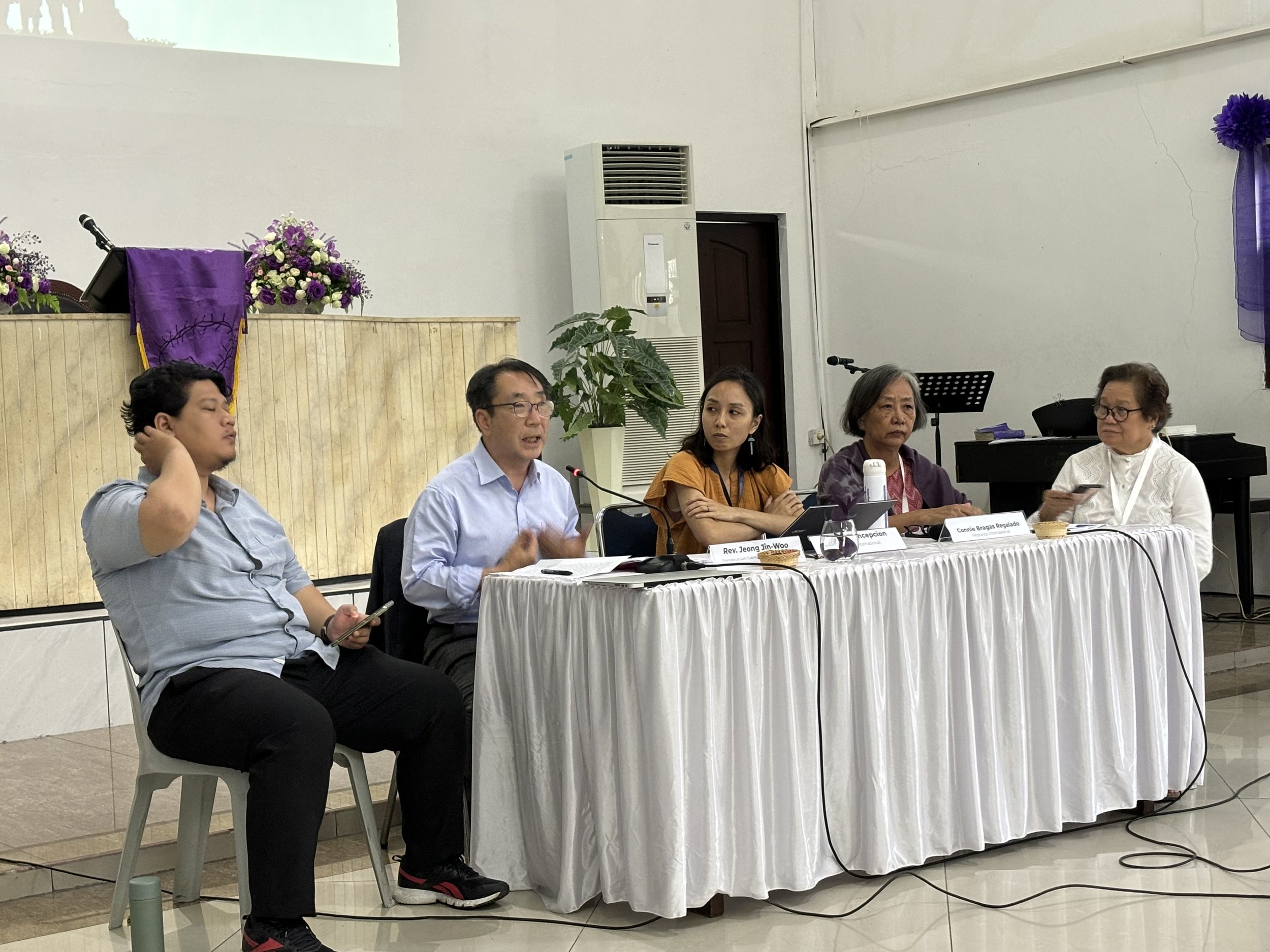Interfaith Conference on Service and Advocacy (ICSA) 2024 Successfully Conducted
Group photo from the ICSA 2024
“We are united in our resolve to address the root-causes of forced migration. We will continue to pursue a just and humane society where people are no longer forced to leave their families and countries behind.”
(Excerpt from the Opening Interfaith Service of the ICSA 2024, 26 February 2024)
Driven by faith and deep sense of compassion, unwavering commitment for justice, and perseverance to serve and advocate for the rights of migrants, refugees, asylum seekers, internally displaced peoples, and people in varied forms of forced migration including human trafficking, seventy-six (76) participants representing various faith communities, migrant serving institutions, and grassroots migrant organizations and movements assembled from February 25 to 27, 2024, at the Bait Allah Christian Evangelical Church in Sangihe in Jakarta, Indonesia for the successfully concluded Interfaith Conference on Service and Advocacy (ICSA) . The participants came from various regions of the world -Asia and the Pacific, Africa, Latin America, North America, and Europe.
The two-days ICSA 2024 was jointly organized by the Asia Pacific Mission for Migrants (APMM), Asia Pacific Interfaith Network on Migrants (AP INFORM), Churches Witnessing with Migrants (CWWM), together with the Communion of Churches in Indonesia (CCI), the Progressive Islamic Forum (PIF), Kabar Bumi, and the Beranda Migran. The venue of this meaningful undertaking was graciously hosted by the Bait Allah Christian Evangelical Church in Sangihe.
Beginning February 26, 2024, the ICSA 2024 started with an Opening Interfaith Service facilitated by Mr. Lesley G. Capus of AP INFORM. The Scripture reading from the holy Quran was read by Muhammmad Azka Fahriza (PIF), for the Christian Bible was Olivia Baro Melisa Gade Vakalegu, Ecumenical Youth Enabler from the Pacific Council of Churches (PCC), and Wichai Juntavaro of the Spirit in Education Movement in Thailand who read a meaningful quotation from the 14th Dalai Lama. A very meaningful song entitled “Can you See Me?” written and composed by Sr Margaret Scharf Op for Australian Catholic Religious Against Trafficking in Humans (ACHRATH) beautifully concluded the interfaith service.
Afterwards, welcome remarks from the leaders of the host faith communities and lead organizers of the event were provided. They were led by the Rev. Jacklevyn Manuputy, General Secretary of the Persekutuan Gereja-gereja Indonesia (PGI) or the Communion of Churches Indonesia (CCI) and Pastor Stevany of the Bait Allah Christian Evangelical Church in Sangihe. Eventually they were followed by the Rev. Joram Calimutan, lead convener of AP INFORM and Aaron Cedaroy, General Manager of APMM. A simple roll call of participants facilitated by Ms. Jimarie Snap Mabanta from the National Council of Churches in the Philippines and the CWWM followed the welcome remarks.
Keynote speeches on regional situation, cooperation and solidarity
Afterwards the first Keynote Speech focusing on the Asia-Pacific Regional Situation was delivered and presented by Sringatin, Chairperson of Indonesia Migrant Workers Union (IMWU) in Hong Kong. In her analysis of the changes, current trends and issues to migration brought about by the recurring impact of the pandemic and the multiple global crises, she highlighted that: “The exploitation and oppression of migrants is grave, while protection and services are minimal or completely absent. Migrants are treated as disposable labor or underclass in host countries while governments of sending countries are more concerned with the biggest profit and remittances they can get from their overseas nationals. Migrants, refugees and displaced people in the region face multiple problems. These can range from problems with duty bearers to the private sector, from individuals to as a community, across gender and nationality.”
The second Keynote Speech was delivered by Rev. Dr. Liberato C. Bautista, former coordinator of the NCCP Human Rights Program and author/co-authored 2 books published by CWWM regarding migration. Rev. Dr. Bautista is also the current President of the Conference of NGOs in Consultative Relationship with the United Nations, as well as, the Assistant General Secretary for UN and International Affairs of the General Board of Church and Society of the United Methodist Church.
In his presentation, the Rev. Dr. Bautista emphasized the need to expand and strengthen our reach and the breadth of services we can provide specially among the faith communities. He further exhorted the participants to build infrastructure of care and protection to migrants, refugees, asylum seekers, internally displaced peoples, and people in varied forms of forced migration including human trafficking - both at the national and regional levels. Further he stressed that amidst the crisis- be it the old normal or the new normal, forced migration is bound to continue. Therefore, we are in consensus that as faith and migrant communities, we must not only display determination and innovation in responding to the crisis situation, but also view and respond to the situation as our next normal.
Ms. Janejinda Pawadee, Social Worker and Organization Liaison of Lift International provided an input entitled “Confronting the challenges and obstacles in defending the rights and well-being of migrants, refugees and other displaced people.” Ms. Pawadee provided an in-depth and informative account of the experience of displaced and uprooted people in Thailand like the migrant workers coming from the Mekong region, refugees from Myanmar and the Rohingya refugees. Based on the situation of these vulnerable groups, she emphasized the need to re-examine the role of the ASEAN, the UN, of Thailand as home for migrants and refugees, and roles of various NGO/INGOs, FBOs and CBOs, and our very selves as well.
Panel presentations on service and advocacy cooperation
Two panel discussion also featured the first day of the ICSA 2024. The first set of panellist focused their discussions on Faith and Migrant Communities upholding the rights and well-being of migrants, refugees and other displaced people though service and protection. The panellist includes Ms. Cynthia Abdon-Tellez, General Manager, Mission for Migrant Workers, Hong Kong and Hope Hero Awardee 2024, Wichai Juntavaro of the International Network of Engaged Buddhist based in Thailand, Rev. Sonnya Marice Uniplaita, Head of Women and Children Bureau of the Persekutan Gereja-gereja Indonesia (PGI), and Sr. Anastacia Ratnawati, representing the Roman Catholic Church in Indonesia.
The second set of panellist on the other hand focused on Faith and Migrant communities’ successful advocacy, campaign and lobbying. The panellist includes the Rev. Jeong Jin-woo, of the Seoul Diapsora Church in Seoul, South Korea a unique Christian church established for migrant workers in the country, Azhar Irfansyah from the PIF, and Joana Concepcion, current Chairperson of Migrante International together with Connie Bragas Regalado their Chairperson Emeritus.
Both set of panelist stressed that as faith-based bodies, service organizations and grassroots organizations and movements, must continuously share and learn from each other’s concrete practice and experiences, strategies (including best practices), resources and perspectives on how to effectively deal with the issues of those who were uprooted and displaced in a world where migrants, refugees and uprooted peoples are commodified ad commoditized, where they are rendered invisible to serve like cogs in a dehumanizing system. Participants were urge to persevere and be persistent to build an architecture of welcome and solidarity to the very people we opted to serve.
Interfaith reflection, workshops and presentations
The following day, February 27, 2024, the activity started with an Interfaith prayer led by Indrapasa Lazuardi, National treasurer of the PIF. Immediately a theological reflection was provided by Dr. Muriel Montenegro-Orevillo, head of the Interfaith Cooperation Form of the Asia Pacific Alliance of YMCA (APAY). Dr. Montenegro-Orevillo prayed that the ICSA 2024 conference will lead the participants to a deeper understanding of our faith traditions and bear fruits through more strategic plans and actions. She further prayed that may the God who reveals to us in many names and many ways guide our paths in forging cooperation and solidarity with those who are forced to migrate, those who have become refugees, and displaced, uprooted from their homes.
The Rev. Joram Calimutan, lead convener of AP INFORM provided an orientation of the nature and intent of the network. This is in order to enable the conference participants understand further the pivotal role and mandate of the network, and to encourage as well everyone to fully support and take active part of the network. Likewise, participants were further encouraged to form a similar network in their particular countries and regions.
In the afternoon that day, two workshop activities provided us a splendid venue to reflect and analyse how we can continuously work together both at the national and regional levels- in strengthening cooperation and partnership through service to migrants, refugees and other displaced people, as well as, in exploring ways of cooperation and solidarity through advocacy, campaign and lobbying. As a result of which, the following were identified:
Workshop 1: Strengthening cooperation and partnership through service to migrants, refugees and other displaced people.
Provide more access to center-based services programs and facilities that offers such services such as but not limited to temporary shelter/ sanctuary, Safe spaces, Counselling, Psycho-social activities, meetings and “religious activities”.
Develop sufficient programs and resources for providing relevant social assistance and repatriation for migrants, refugees and IDPs wanting to go home.
Greater access to Para Legal Services.
Capacity building initiative such as but not limited to:
Setting up of training centers focusing on minimizing/mitigating difficulties experienced by migrants prior to departure, during and upon returning from migrant receiving countries.
Skills development- organizing, livelihood, para-legal, etc.
Women empowerment initiatives (including economic)
Life skills and livelihood interventions
5. Community Organizing and Mobilization work (activating self-sufficient communities of
migrants)
6. Awareness raising in broader platforms and venue such as the academe, seminaries,
mentorship with youth.
7. Sustained lobby work with relevant government agencies and institutions and mechanisms.
8. Sensitization of employers and labor recruiters
9. More access to Health Services- occupational health and safety, and mental and psychosocial Intervention.
10. Developing an appropriate insurance schemes.
Workshop 2: Exploring ways of cooperation and solidarity through advocacy, campaign and lobbying.
Advocacy Campaigns:
Active engagement with relevant local and national government agencies
Regional advocacy for specific government policies detrimental to migrants
Development of guidelines or policy to strengthen advocacy
We need to mainstream/involve the migrant organization and issue to the concerns of the faith-based organizations. (representation)
Mainstream the One billion rising campaign
2. Education and Capacity Building
TOT on Para Legal for Migrants
Enabling formation of welfare committees among migrant orgs/groups
Develop and implement relevant, sustainable and economically empowering livelihood projects
3. Research
Develop a sort of “communication system” to enhance network coordination
Mapping of migrant and refugee serving institutions in the region
Develop a research data base on Migration that includes comprehensive studies on migration trends and issues.
Directory of migrant servicing institutions organizations and services (regional)
4. Alliance and Networking
Strengthen local or national organization and alliance formation
Organize AP INFORM either nationally or regionally
Engage in pressing regional coalitions and coalition building work
Involve the national labor organization and labor unions to support and struggle with migrants.
5. Resource mobilization:
Willfully share resources for national, regional and international initiatives
Study on” Employer policies and practices”
A draft Communique (see here) initially drafted by Lesley Capus of AP INFORM was presented to the participants for comment and improvement. After a brief discussion regarding the form, intent and content of the draft, it was unanimously agreed that the Rev. Dr. Liberato Bautista would be requested to finalize the conference communique and would be presented to the CWWM 12th international Consultation on March 1, 2024. Likewise, it is agreed further that the Communique would be jointly adopted by the ICSA 2024 and the CWWM consultation participants.
The ICSA 2024 concluded through a simple Closing Devotion led by the Rev. Joram Calimutan. The participants strongly expressed unity with love and compassion, and in full determination and innovation to pursue such a just and worthy cause that enables faith communities and migrant serving institutions to be more open and embracing in working together through partnerships and cooperative engagement or endeavours with grassroots migrant organizations and movements in the national and regional levels and context.
See photos from the Conference below:
